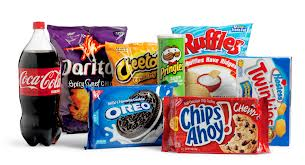First off, I want to start by saying that I absolutely hate the term “junk food.”
There are whole and minimally processed foods that contain large amounts of vitamins and minerals, and there are highly processed foods that contain very small amounts of vitamins and minerals.
That’s it.
There aren’t any “bad” foods, and there aren’t any “good” ones.
It’s your diet as a whole that determines health, performance, and body composition, not individual food choice.
Therefore, every food can fit in to a well-balanced nutrition plan, and the amount of less-nutrient dense (junk) foods you can eat is directly related to the TOTAL amount of calories you consume on a daily basis.
Don’t believe me?
Think this is a load of bull?
Who can blame you?
What I said goes completely against most conventional wisdom.
However, I challenge you to keep reading, and to do so with an open mind, because “junk” food consumption IS related to total food intake, and I’ve provided two examples below to help better illustrate this point.
Scenario #1- Yours Truly
In order to maintain my bodyweight, I need to take in around 3000 calories per day.
Now 3000 calories isn’t a ton of food, but it certainly provides me the ability to fit a good amount of junk food in to my daily routine. And that’s because if I’m eating a wide variety of nutrient dense foods (which I am), I can meet my vitamin, mineral, and fiber goals in the first 1500-2000 calories.
At this point, I’ve maximized my health and performance (priority #1), so my focus then becomes getting in enough calories (energy) to support my intensity in the gym, maintain my body weight, while choosing foods that minimize gastrointestinal upset.
I could finish out my day by eating some more sweet potatoes, oatmeal, or chicken breast, but why would I?
Not only would that be god-awfully boring, but I’ve gotten in enough micronutrients and fiber to support optimal health and function, so filling in the remaining 1000-1500 calories with pizza or a cheeseburger will come at no consequence.
Usually, I’ll end up eating some more nutrient dense foods. Not because I think oatmeal provides any more benefit at this point than a piece of pizza, but because I’m a broke college kid that can’t afford to eat out all of the time.
With that being said, I’m a pizza fiend, and if faced with the decision between demolishing some pizza and nuking up a sweet potato, I’ll choose the pizza every time.
Scenario 2 – Female Figure Competitor
Let’s now compare my situation with that of a female figure competitor that’s dieting on 1800 calories per day.
As I mentioned earlier, it takes about 1500-2000 calories to meet all of your micronutrient and fiber needs, and that’s only if you’re eating a wide variety of nutrient dense foods. If you’re monotonous and like to eat the same crap all of the time, it’ll take even more.
If her total food intake is only 1800 calories, she simply doesn’t have the wiggle room to fit in a bunch of “junk” food. If she does, one of two things will happen:
A) She won’t get in enough micro-nutrients and fiber to maximize her health and performance.
B) She’ll go over her calories for the day and won’t lose any body fat.
Not good.
It’s also important to note that she’s dieting, which means that as she gets leaner, hunger becomes more and more of an issue.
Chocolate chip cookies, Reese’s cups, ice cream?
Sure, those foods may taste good, but they don’t hold nearly the level of satiety as oatmeal or a large sweet potato.
And when it comes to losing body fat, especially long term, satiety is of the utmost importance.
It’s All Situational
I know these were only two examples, but I think they do a good job of illustrating that when talking about nutrition, everything is situational.
If you have a lot of lean body mass, a fast metabolism, and exercise on a regular basis, eating some junk food really isn’t a problem. Conversely, someone with a lot of fat mass, a slow metabolism, and who barely does any exercise should probably limit the amount of junk food in their daily routine.
With that being said, I think that EVERYONE can find a way to make junk food and a healthy lifestyle co-exist, and this can generally be accomplished by following the 80:20 rule. 80% of your food intake should come from nutrient dense and minimally processed sources, and 20% can come from anything else.
Remember, it’s all about balance.
Mental health is just as important as physical health.
And at the end of the day, there are no bad foods, only bad diets.
Like What You See?
Get the Smoot Fitness Guide to Getting Stronger - FREE.




Leave a Reply